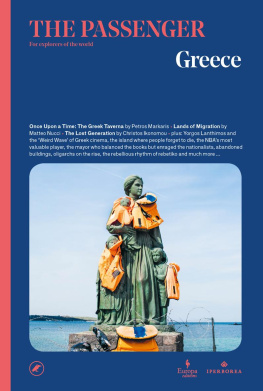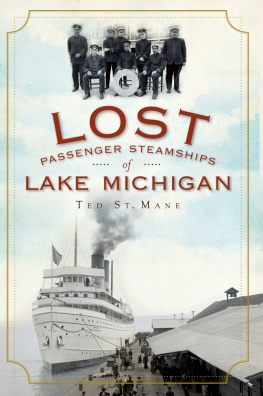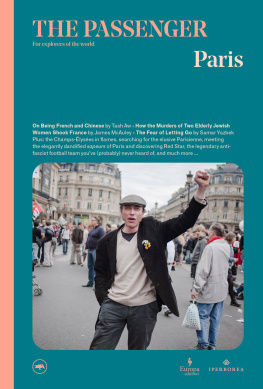The Passenger Greece
Greece
If you were to measure the media attention received by any one country over the course of a decade say, the ten years since 2010 not many could boast the level of coverage focused on Greece, and this despite being relatively small geographically and economically. Likewise, few countries are portrayed in such a variety of ways, depending on ones perspective. Lets play this game together with a hefty dose of generalisation: viewed from the east, Greece is historically the enemy (what the Turks know as Independence, the Greeks call the Catastrophe); looking from the Middle East or the north-African shore of the Mediterranean, it is a place that people are desperate to reach; from the west, it is seen as an awkward relative best kept at arms length (We are not Greece is a common refrain in some parts of Europe); if you come from the north, Greece is the grave of the European Union; but, if you live in Greece, the country is the cradle of Western civilisation. It is also a sacrificial victim at the mercy of powerful interests if you are a dove, while from a hawkish perspective it is irredeemably corrupt and dragged down by bureaucracy. Whatever your angle, though, it seems impossible not to have an opinion. This is what happens when youre pushed on to the world stage: stories are drowned out by news, emotions trump facts and personalities take the place of actual people. The team who worked on this volume was no different; everyone had their own view on Greece and, guess what, each was different. We did our best to ignore our preconceptions in our efforts to restore dignity to stories, facts and people; you, as readers, will decide whether we have been successful. One thing is certain, however, after working on this we all tried to slip back into our old preconceptions but we realised they no longer held.

Contents
The photographs in this issue were taken by the documentary photographer Pietro Masturzo. After graduating in international relations from the University of Naples, he devoted himself to photography and reportage, focusing on social and political issues. He has worked in the Middle East, Southeast Asia, Europe and North Africa, documenting wars and human-rights violations. His photographs have appeared in numerous magazines and newspapers, including LEspresso, Corriere della Sera, La Stampa, Internazionale, The New Yorker, Le Monde and Vanity Fair. His work has been recognised with numerous awards, including the prestigious World Press Photo of the Year in 2010 for his image of Iranian women shouting their disapproval of Mahmoud Ahmadinejads election as president from a Tehran rooftop.
The Mythbuster
Debunking stereotypes and clichs
ELISABETTA GARIERI
Translated by Alan Thawley
Ancient Greek has nothing to do with the modern Greek language.
Greek was never subject to the same sort of hiatus that gave rise to the Romance languages after the demise of Latin. Including its dialects Grecanic in Calabria, Griko in Puglia and the diaspora down the ages, Greek is spoken by 13.5 million people and is the oldest attested living European language. It has evolved, of course: simplification of the grammar, lexicon introduced by periods of foreign control (Turkish, Italian, Venetian, French ) and phonetic changes. The language has also suffered the effects of purist tendencies aiming to bring it closer to an idealised past: the Attic dialect of classical Athens as studied in school. Western philology originated during the Renaissance, when people once again began to study the classical language, but, in the meantime, Greek had been transformed and had almost entirely ceased to be spoken in the West. The discrepancy between written and spoken Greek widened until the language question emerged in the late eighteenth century. Serious enough to cause protests and deaths, this dispute pitted supporters of katharevousa, purified Greek, against champions of dimotiki, the language of the people, which has been the official language since 1976.

The sirtaki is a traditional Greek dance.
The sirtaki was choreographed in 1964 for Michael Cacoyanniss film Zorba the Greek, based on the masterpiece of the same name by the novelist Nikos Kazantzakis. Driven by the films global success, Zorbas Dance became a tourist icon and began to be taught in Greece because of the high demand. The melody is a composition by Mikis Theodorakis, inspired by the Kritika syrta (Cretan syrta) he had heard at traditional panigiria festivals in Chania. According to the director, the name sirtaki was chosen at random, based on the term syrtos, deriving from syro, meaning to pull, which references various traditional dances with a dragging step. The steps of the sirtaki are hopped, however, and were inspired by the hasapiko, the ancient dance of the butchers of Constantinople and Macedonia. It seems that the sirtaki was choreographed by the dancer Giorgos Provias who taught the actor Anthony Quinn along with his colleague Dimos Ambatzoglou but was forced to leave the shoot before the end of the film and did not enjoy the fame he deserved.
A Sign of the Times
THOMAS TSALAPATIS
Translated by Konstantine Matsoukas
S ixty-three people among them Dimitris-Richardos Mylonas, the 51-year-old owner of the chain of pawnshops that bears his name were arrested in a police operation in Attica, Volos and Thessaloniki, mounted to dismantle two criminal organisations engaged in gold trafficking. Known from his TV commercials, Richardos is owner of more than thirty stores.
They legitimised the profits of their criminal activities through the acquisition of property such as expensive homes, land, vehicles and boats, the expansion of businesses and so on, through specific processes that met the three stages of legalisation required by law: placement, layering and incorporation, the police press officer said.
The financial losses to the state amounted to many millions of euros. For the period from June to October 2018 the police estimate state losses from gold trafficking at close to 1 million for each group. Evidence points to networks that involve, among other things, forged invoices, fake winning lottery tickets, Chinese clothing wholesalers, as well as shares in companies and property and so on. Dozens of shops selling and buying gold, jewellery shops and silversmiths workshops in the centre of Athens, in the suburbs and in the area around the capital seem to have been involved, directly or indirectly, in the activities of two large organisations that exported gold illegally to Turkey in return for enormous profits.















